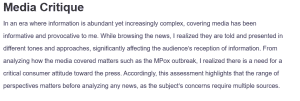Media Critique
In an era where information is abundant yet increasingly complex, covering media has been informative and provocative to me. While browsing the news, I realized they are told and presented in different tones and approaches, significantly affecting the audience’s reception of information. From analyzing how the media covered matters such as the MPox outbreak, I realized there is a need for a critical consumer attitude toward the press. Accordingly, this assessment highlights that the range of perspectives matters before analyzing any news, as the subject’s concerns require multiple sources.
Key Lessons Learned about Media Coverage
I have learned that media coverage can vary significantly across different outlets, each presenting unique perspectives on the same issue. For example, CBS News may primarily concern itself with operational considerations, while CNN’s audience is most concerned with politics, and BBC is most concerned with people. These various reportages demonstrate how the tone and emphasis influence people’s perception of an incident. Moreover, I realized that how and what is said determines how the story goes, or in other words, it influences the audience’s understanding. Ultimately, I realize the importance of consuming news from multiple sources to gain a well-rounded understanding of complex topics.
Changing My Approach to the Media
Based on my experience, I would modify the perspective on media consumption and try to find more diverse sources to get the complete picture of the particular issue. I prioritize understanding the underlying factors and implications behind the coverage rather than just the surface details. Also, it would help to evaluate different sources’ tone and main subjects regarding possible biases or lack of information (Paulus et al., 2022). Lastly, I would interact with people more often to get to know their opinions regarding different issues and increase my comprehension of issues, which may be multifaceted.
Advice about How to Evaluate the Media
To begin with, when evaluating the media, it is advisable to check the source’s credibility. Notably, the sources should preferably name evidence sources, references, and opinions of experts that prove that the data received is credible. Additionally, being mindful of the tone and language used is recommended, as sensationalist or emotionally charged language can indicate bias. Choosing multiple sources to compare several views and determine if all the outlets omit some aspects is crucial (Rodrigo-Ginés et al., 2023). The last thing would be to challenge what is being put forward as news, the ownership of a station, funding, or the political leaning of a station.
Trusted News Outlets
I now trust some news outlets like BBC News and The New York Times more because learning offers me detailed and well-researched articles on specific topical issues, offering a balanced view. I trust them because they are core to their professionalism, and their work entails having to verify the facts presented. On the other hand, I trust some outlets less, like sensationalist tabloids, due to their tendency to prioritize attention-grabbing headlines over factual accuracy. Moreover, they all are oriented toward entertainment rather than informative content, which causes certain doubts concerning their validity and reliability.
Conclusion
In conclusion, I have learned many important aspects of the media regarding its role and importance in explaining incidents. I now understand why critical appraisal of sources is essential and the importance of getting all sides of the story in developing a robust position. This journey has reaffirmed the belief that enlightened citizens are more ready to understand the realities of contemporary information and make the best sense of the world. Henceforth, I will bring these insights to bear and encourage the general public to promote better news literacy.
References
Paulus, D., Fathi, R., Fiedrich, F., de Walle, B. V., & Comes, T. (2022). On the interplay of data and cognitive bias in crisis information management. Information Systems Frontiers. https://doi.org/10.1007/s10796-022-10241-0
Rodrigo-Ginés, F.-J., Carrillo-de-Albornoz, J., & Plaza, L. (2023). A systematic review on media bias detection: What is media bias, how it is expressed, and how to detect it. Expert Systems with Applications, 237(121641), 121641. https://doi.org/10.1016/j.eswa.2023.121641
ORDER A PLAGIARISM-FREE PAPER HERE
We’ll write everything from scratch
Question
Write an essay evaluating your experience with the media critique assignment. Consider the following questions and concerns
- What have you learned about media coverage?
- What would you change about your approach to the media based on your experience?
- What advice would you give people about how to evaluate the media?
- Are there particular news outlets that you now trust more (or less)?Why?
There are other questions to consider, I‘m sure, but these are the main ones that come to my mind. Feel free to move beyond them if you think of others, but use them as a template if you can‘t think of your own.
Above all, the analysis should be rooted in your authentic experience over course of the assignment, and it ought to reflect what you‘ve actually learned from that experience.

Media Critique
Required Elements
- An introduction that puts your experience in context
- A thesis that sums up your evaluation of your experience
- Supporting evidence from in the body paragraphs that illustrates and develops your evaluation {think of your article critiques and your journal)
- A conclusion that offers perspective on your experience
Leading up to the Assignment
In the weeks leading up to the assignment, we discussed the way different outlets cover a story, and then I asked you to keep a journal for a week in which you followed the same major story as reported by different media outlets. After that, I assigned you some articles to critique. Finally, I am asking you to sum up your experience by addressing a few key questions. (listed above)

